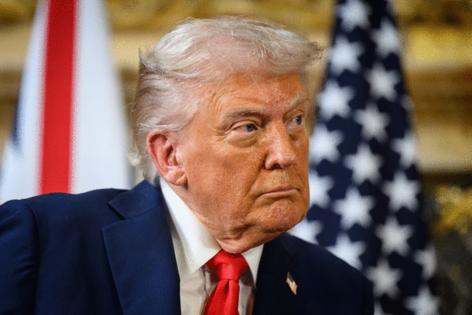Trump says Putin 'let me down' after meeting Starmer on Ukraine
Published in News & Features
President Donald Trump said Russian President Vladimir Putin had “really let me down” after meeting with UK Prime Minister Keir Starmer to discuss efforts to heighten pressure on Russia to enter negotiations that could help bring the Kremlin’s three-year war in Ukraine to an end.
“War is a different thing,” Trump said during a joint press conference at Chequers, the country house of the prime minister, following the meeting. “Things happen that are very opposite of what you thought. You thought you were going to have an easy time or a hard time, and it turns out to be the reverse.”
“He has let me down. I mean, he’s killing many people, and he’s losing more people than he’s, you know, than he’s killing.”
Starmer said their discussions had included “how we can build our defenses to further support Ukraine and decisively increase the pressure on Putin to get him to agree a peace deal that will last.”
“In recent days, Putin has shown his true face mounting the biggest attack since the invasion began with yet more bloodshed, yet more innocents killed an unprecedented violations of NATO airspace,” Starmer said. “These are not the actions of someone who wants peace.”
Trump said that the conflict, which began in 2022, was unlikely to affect the U.S. directly — unless it resulted in a sweeping world war — but added that he remained committed to ending the bloodshed. Still, when asked specifically what he planned to do to pressure Putin, the president did not answer directly.
“The Russia situation — I hope we’re going to have some good news for you coming up,” Trump said.
Starmer said that it was important for Trump to intervene because it was only with his pressure that Putin has “actually shown any inclination to move.”
Neither leader laid out in their introductory remarks what concrete steps they were planning to take, but Ukraine’s allies have been weighing a fresh bid to impose tariffs on Russian oil buyers and plans for a potential meeting between Trump and Ukraine’s President Volodymyr Zelenskyy on the sidelines of the United Nations General Assembly meeting in New York next week.
Trump has been urged to heighten pressure on Putin as the Russian leader has relentlessly continued his military campaign in the wake of his August meeting in Alaska with the American president. A Putin-Zelenskyy meeting, which Trump had heavily encouraged, shows no signs of happening as renewed efforts to quickly broker a ceasefire or peace accord faltered.
At the same time, the Group of Seven nations has been developing a new sanctions package, fed by Trump’s assurances he’s ready to target India, China and other buyers of Russian crude if other NATO nations do the same.
While Trump unilaterally raised U.S. tariffs on products from India over its Russia energy purchases, the White House has so far resisted escalating by targeting China as well, or other foreign buyers — indicating it would do so if European or G-7 powers did as well.
Further moves to clamp down on Russia’s oil sales could starve the Kremlin of revenue helping finance the war in Ukraine but also tighten energy supplies globally. Meanwhile, doubling tariffs on India has strained ties between Washington and New Delhi.
One U.S. proposal that’s been advanced calls for secondary tariffs of as much as 100% on goods from China and India as well as other trade restrictions meant to curb the flow of Russian energy and prevent the transfer of dual-use technologies into Russia.
Zelenskyy has suggested that a stepped-up economic pressure campaign — including U.S. sanctions — could compel Putin to the negotiating table, telling Sky News earlier this week that Trump has “enough force to make Putin afraid of him.”
European sanctions packages have been advanced, Zelenskyy said, adding: “All that’s lacking now is a strong sanctions package from the U.S. More needs to be done, quicker.”
Ukraine has figured into Trump’s trip to the UK — the second state visit of his second term — with King Charles III on Wednesday describing united resolve to support Ukraine, counter tyranny and “deter aggression.”
Trump has appeared increasingly frustrated with Putin since the Aug. 15 summit with the Russian leader and has frequently described the Ukraine war as the most challenging international dispute he’s attempted to resolve. Trump initially had suggested the war could be ended by his first day back in office.
Instead, Russia has stepped up its missile and drone attacks on Ukraine, unleashing large, lethal strikes on Kyiv in defiance of Trump’s calls for peace. After Russian drones crossed into Poland earlier this month, the NATO member asked for additional air defense systems to protect against future incursions.
Over the past month, Ukrainian military forces have intensified drone attacks on Russian energy facilities, including a strike reported earlier this week on an oil refinery in the country’s Volga region, seen as a bid to curb flows of fuel to the front lines. Two other refineries were attacked on Thursday.
Under Trump, the U.S. has markedly shifted its approach to the conflict, pivoting from military aid payments under former President Joe Biden to new weapons sales to NATO members.
Trump had been seeking a trilateral meeting with Putin and Zelenskyy joining him at the negotiating table, an idea he rekindled before departing for the UK. Trump told reporters it appeared he’d have to “sit in the room” with the two leaders for a meeting, given their hatred for each other.
U.S. officials have indicated that Putin is seeking to occupy more Ukrainian territory as part of any agreement. Ukraine has long insisted that the country needs commitments from Europe and the U.S. to further deter further Russian aggression.
_____
©2025 Bloomberg L.P. Visit bloomberg.com. Distributed by Tribune Content Agency, LLC.







Comments